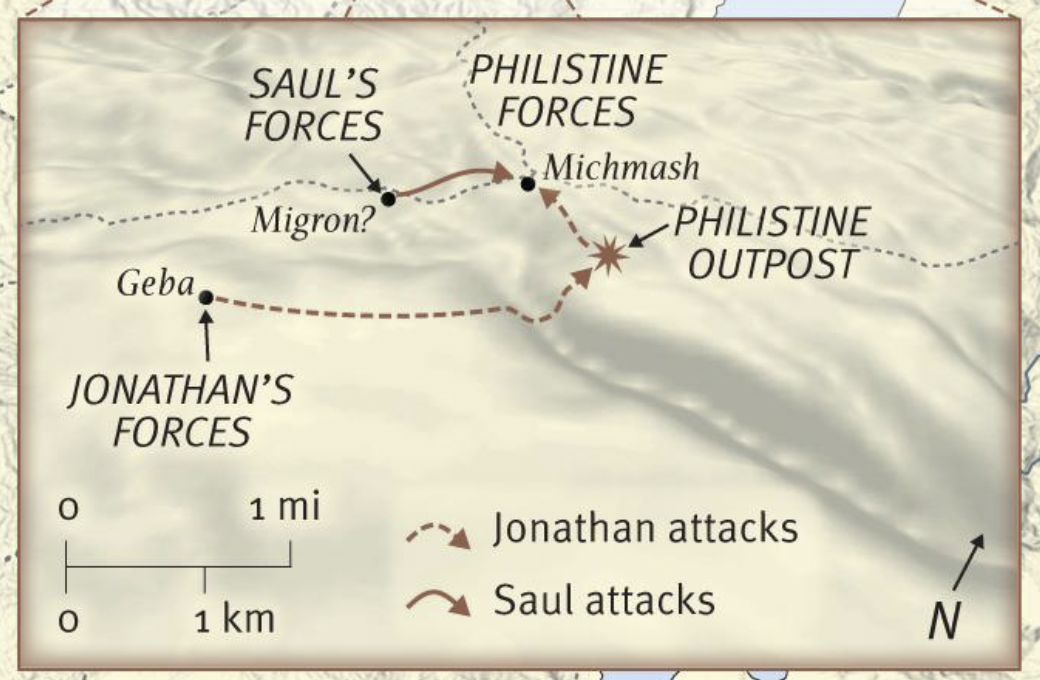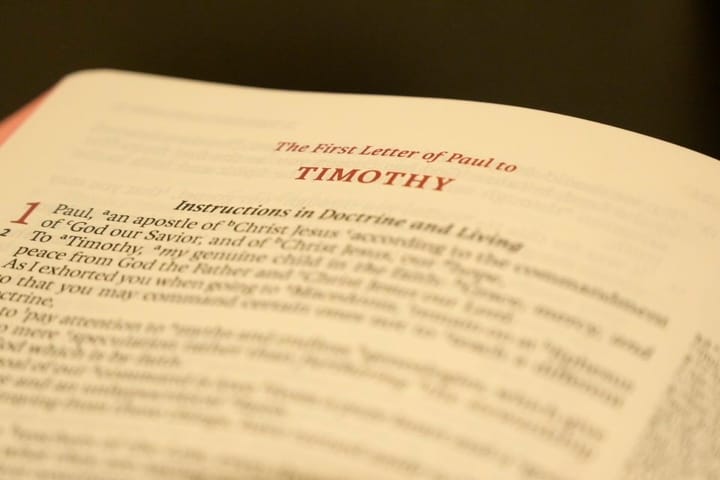A Disobedient Heart — 1 Samuel 13:1–14
Chosen and anointed out of obscurity, Saul succumbed to fear and impatience and violated God's law by offering sacrifices to God as a priest.

| Listen on Apple Podcasts | Listen on Spotify |
|---|
Introduction
Last week in 1 Samuel 8, we saw Israel's treachery on full display when they defied God and wanted to be like other nations, replacing God with an earthly king.
In the subsequent three chapters, through a rapid series of events, a man from the tribe of Benjamin named Saul emerged as Israel's first king. Saul was "a choice and handsome man" (9:2) in the prime of his life, and "he stood a head taller than anyone else" (10:23 CSB).
Saul was named king three times, once in private and twice in public.
- In a private anointing, Samuel pours oil on Saul's head and declares him as Israel's ruler.(10:1).
- The first public announcement occurred when Samuel gathered Israel at Mizpah (10:17). After an elaborate process of elimination, Samuel declared Saul as king even though Saul was nowhere to be found. In his shyness, Saul was "hiding himself by the baggage." (10:22)
- A second public ceremony comes after his initial success in battle over the Ammonites (11:1–15). "So all the people went to Gilgal, and there they made Saul king before Yahweh in Gilgal." (11:15)
God had given Saul a great start, and Samuel admitted in 1 Samuel 12 that he was now "old and gray." Despite Israel's faithlessness, Samuel reassured them that Israel's monarchy would work as long as the king and the people followed God.
Samuel exhorted Israel, "Only fear Yahweh and serve Him in truth with all your heart; for see what great things He has done for you. But if you still do wickedly, both you and your king will be swept away." (12:24–25)
This now brings us to the pivotal account of King Saul in chapter 13. We'll divide 1 Samuel into four sections: the setting (v.1–7), the violation (v.8–10), the explanation (v.11–12), and the judgment (v.13–15a).
1. The Setting (v.1–7)
"Saul was thirty years old when he began to reign, and he reigned forty-two years over Israel" (v.1)
- "Saul lived for one year and then became king, and when he had reigned for two years over Israel." (ESV)
- The numbers in 1 Samuel 13:1 were lost in the early transmission of the Hebrew text.
- LXX omits this verse entirely.
- 1 and 2 Samuel were likely written and compiled a couple of generations after King David.
Excursus: Transmission of OT Text
- The original writings (autographs) of the biblical authors before the exile including 1 Samuel were written on papyrus, but no original autographs have survived.
- Each book of the OT was copied numerous times over the centuries.
- The oldest manuscripts we have of the OT are the Qumran Scrolls, also called the Dead Sea Scrolls, and some of these scrolls are dated to 300 BC. The DDS of Isaiah, which contains all 66 chapters of Isaiah, is dated between 150–100 BC.
- A group called the Masorites sought to reproduce the complete Hebrew Old Testament between 500 and 1000 AD. The earliest complete Hebrew Old Testament text that we have today is called the Leningrad Codex 19a, which is dated about 1009 AD.
- All modern editions of the Hebrew Old Testament is based on this text, also called the Masoretic text.
- And the Old Teatament in the English Bible we have today is a translation primarily of this Masoretic text.
1 Samuel 13:1 of the Masoretic Text literally says, “Saul was a son of a year in his reigning and two years he reigned over Israel.” [USBH]
- Obviously, (1) Saul was not one year old when he became king, and (2) he reigned for more than two years.
- Luke records the apostle Paul saying, "After...Samuel the prophet. Then they asked for a king, and God gave them Saul the son of Kish, a man of the tribe of Benjamin, for forty years." (Acts 13:21)
- So the addition of the numbers 30 and 40 is based on Acts 13:21 and Jewish historian Josephus who recorded that Saul reigned for 20 years (Antiquities 6.348) and 40 years (Antiquities 10.143). [ESVSB]
"Saul chose for himself 3,000 men of Israel...2,000 were with Saul...while 1,000 were with Jonathan." (v.2)
- Time has elapsed since Saul was anointed as king when he was described as a "handsome, young man" (ESV, NIV) in 1 Samuel 9:2.
- Now Saul's firstborn son, Jonathan, was old enough to be capable of commanding troops.
- Saul was in Michmash which was about 6–7 kilometers northeast of Jonathan who was at Gibeah of Benjamin. [RSB]
"Jonathan struck the garrison of the Philistines that was in Geba, and the Philistines heard of it. Then Saul blew the trumpet throughout the land." (v.3)
- This Philistine garrison was less than 5km from Gibeah and posed a significant threat to Israel's heartland and Saul's kingdom. [CSBSB]
- *Geba* was located between Jonathan’s forces at Gibeah and Saul’s forces at Michmash [NLTSB]
- When the Philistines became aware of their defeat, Saul blew the trumpet to muster a larger army (Judg 3:27) to prepare for an anticipated larger battle.
"The people were then summoned to Saul at Gilgal." (v.4)
- Gilgal was an important city. It was Israel's base camp during the days of the conquest (Josh 4:19)
- Samuel had set a pattern to go to Gilgal regularly to serve as Israel's judge and priest. (1 Sam 7:16)
- 1 Samuel records Samuel asking Saul go to Gilgal and wait on God three times. Offerings and sacrifices would be made at Gilgal on Samuel's arrival.
- The first time was after His private anointing: "And you shall go down before me to Gilgal; and behold, I will come down to you to offer burnt offerings and sacrifice peace offerings. You shall wait seven days until I come to you." (1 Sam 10:6)
- The second time was to crown Saul king: Then Samuel said to the people, “Come and let us go to Gilgal and renew the kingdom there.” So all the people went to Gilgal, and there they made Saul king before Yahweh in Gilgal. There, they also offered sacrifices of peace offerings before Yahweh; and there, Saul and all the men of Israel were exceedingly glad. (1 Sam 11:14–15)
- The third time Saul is asked to wait at Gilgal for Samuel is here in 1 Samuel 13.
"Now the Philistines assembled to fight with Israel, 30,000 chariots and 6,000 horsemen" (v.5a)
- The Masoretic text says 30,000. The ancient Syriac text and one tradition of the LXX reads 3,000. [UBSH]
- This is why some English translations (NIV, CSB, NLT) have 3,000 chariots.
- Whether the true number was 3,000 or 30,000, the Israelites were outnumbered.
- Military strength was in favor of the Philistines.
"Now the men of Israel saw that they were in a strait (for the people were hard-pressed)." (v.6a)
- The men of Israel "were in trouble" (ESV).
- "Their situation was critical." (NIV)
- "The men of Israel saw what a tight spot they were in." (NLT)
- The Philistines had controlled of the high ground—a clear military advantage. By camping in Michmash (v.5b), they controlled much of the central Benjamin plateau, effectively cutting Israel in half and limiting Saul's access to the coast. [CSBSB]

"But as for Saul, he was still in Gilgal, and all the people followed him trembling." (v.7b)
- Saul's retreat to Gilgal gave the Philistines full control of this region.
- So the Israelites, who sensed this threatening, imminent danger, were hiding in caves and pits.
Application:
- When was the last time you were in a seemingly helpless situation?
- Perhaps you feel like you are in one today?
- In this life as God's people, we likewise are no strangers to uncertainty and perilous circumstances.
So, what is the setting? With the Philistines advancing, Israel was in dire straits. Let's now look at the violation.
2. The Violation (v.8–10)
"So he waited seven days, according to the appointed time set by Samuel." (v.8a)
- This is the same instruction Samuel had given to Saul in 1 Samuel 10:8. After he anointed Saul, Samuel specified to wait at Gilgal for seven days. That time, Saul obeyed.
- Some believe that this "waiting" at Gilgal had a special religious meaning. [ESVSB]
- It is not simply waiting inside an exam room while your doctor is running behind schedule.
"But Samuel did not come to Gilgal; and the people were scattering from him." (v.8b)
-
Samuel did not arrive at the "appointed time." Saul did wait for the full seven days. Samuel was late.
-
His troops were losing morale and starting to scatter. In other words, the people were "deserting him." (CSB)
- So what did Saul decide to do?
Saul said, "Bring near to me the burnt offering and the peace offering." And he offered the burnt offering. And as soon as he finished offering the burnt offering, behold, Samuel came; and Saul went out to meet him and to greet him." (v.9–10)
- Saul took matters into his own hands. Saul knew that God's Law forbade anyone (not even the king) from offering the burnt and peace offering.
- Giving instructions to Israel regarding worship in the tent of meeting, Moses wrote, “But you and your sons with you shall keep your priesthood...I am giving you the priesthood as a bestowed service, but the outsider who comes near shall be put to death.” (Num 18:7)
- But Samuel was late. And Saul’s men were at risk of dying, hiding themselves in caves. And those that retreated to Gilgal were now defecting and abandoning him.
Implication: Worshipping a Holy God
Regarding Saul taking the role of priest, one may ask, "What's the fuss? Why the big deal?"
-
"Nobody is perfect," you may say. Saul had the best of intentions.
-
We must approach a holy God and worship Him in the prescribed manner that He has explicitly sanctioned.
At Sinai, God said to Moses, “Go to the people and set them apart as holy today and tomorrow...and let them be ready for the third day, for on the third day Yahweh will come down on Mount Sinai in the sight of all the people. And you shall set bounds for the people all around, saying, ‘Beware that you do not go up on the mountain or touch the border of it; whoever touches the mountain shall surely be put to death. (Exodus 19:10–12)
Later in the first nine chapters of Leviticus, God gave Israel explicit and detailed instructions on how to approach God and present offerings that would be deemed acceptable. But what happens in Leviticus 10.
Then Nadab and Abihu, the sons of Aaron, took their respective firepans and put fire in them. Then they placed incense on it and offered strange fire before Yahweh, which He had not commanded them. And fire came out from the presence of Yahweh and consumed them, and they died before Yahweh. Then Moses said to Aaron, “It is what Yahweh spoke, saying, ‘By those who come near Me I will be treated as holy, And before all the people I will be glorified.’” (Lev 10:1–3)
We may only approach God in the way that He has prescribed. And today, there is only one way we can come to God, and that is through the Son, Christ Jesus.
- Jesus said, "I am the door; if anyone enters through Me, he will be saved, and will go in and out and find pasture." (John 10:9)
- Jesus said, "I am the way, and the truth, and the life. No one comes to the Father but through Me." (John 14:6)
- Paul writes, "for through [Christ Jesus] we both have our access in one Spirit to the Father." (Eph 2:18)
There is no other way. You may have the best of intentions. You may have great zeal. You may seek and desire the one True God.
-
But if you don't come to God in his prescribed manner, like King Saul, you will be guilty of violating God's command and face God's wrath and judgment.
-
So the setting: the Philistines are threatening Israel.
-
The violation: Saul does not wait and offers unauthorized sacrifices and unsanctioned worship to God.
3. The Explanation (v.11–12)
But Samuel said, "What have you done?" (v.11a)
- Samuel immediately recognized the severity of this incident.
- So Saul gives a seemingly valid explanation.
Read verses 11–12.
- The people were deserting Saul. Saul's armed men were going back home.
- Samuel had not arrived within the appointed time.
- The Philistines were assembling at Michmash, threatening thousands of Israelites hiding in the lower elevation in pits and caves.
- Saul feared the Philistines would soon come down to Gilgal to attack the core of his kingdom.
- Saul understood that he needed God's favor.
- Without God's support, victory over the Philistines would be impossible.
"So I forced myself and offered the burnt offering." (v.12b)
- Saul defends himself before Samuel. "I had no other choice."
Application:
- When you disobey your parents, when you lash out at your wife or husband, when you discipline your children in anger?
- When you tell a small lie, when you harbor envy toward a friend, when you speak hurtful words just to get a laugh?
- Do you make excuses? Do you concoct a sly explanation to justify your actions?
- Invalid reasons cannot placate God and vindicate ourselves and our disobedience.
4. The Judgment (v.13–14)
A. The Verdict
And Samuel said, "You have acted foolishly; you have not kept the commandment of Yahweh your God." (v.13a)
- "You have acted foolishly" is a Hebrew expression that implies both intellectual and moral failure. [RSB]
- Hanani the seer came to Asa, king of Judah, saying, "For the eyes of Yahweh move to and fro throughout the earth that He may strongly support those whose heart is wholly devoted to Him. You have acted foolishly in this. Indeed, from now on, you will surely have wars." (2 Chr 16:9)
- Saul gave his explanation and pleaded not guilty.
- As God's prophet and spokesperson, Samuel announced God's verdict. "Saul, you are guilty."
B. The Sentence
"For now, Yahweh would have established your kingdom over Israel forever. But now, your kingdom shall not endure." (v.13b–14a)
- Saul's sentence is this. He will not be deposed, but his dynasty will end.
- When Saul's kingly rule ends, no future descendant of Saul will retain the crown and hold the royal sceptor.
C. The Successor
Yahweh has sought out for Himself a man after His own heart, and Yahweh has appointed him as ruler over His people because you have not kept what Yahweh commanded you.” (v.14b)
- "a man after His own heart."
- Listen to what Israel's king is supposed to do in the book of Deuteronomy.
And [the king] shall not multiply wives for himself, or else his heart will turn away...Now it will be when he sits on the throne of his kingdom, that he shall write for himself a copy of this law on a scroll in the presence of the Levitical priests. And it shall be with him, and he shall read it all the days of his life, that he may learn to fear Yahweh his God, to carefully observe all the words of this law and these statutes, that his heart may not be lifted up above his brothers and that he may not turn aside from the commandment, to the right or the left, so that he may prolong his days in his kingdom, he and his sons in the midst of Israel. (Deut 17:17–20)
- The king was to write for himself a personal copy of God's law.
- He was to read it all the days of his life and carefully observe it.
- God told Saul that he did not keep God's law, so he will be replaced. God will choose his successor, a man after His own heart.
- So who will succeed King Saul? We'll examine 1 Samuel 16 in two weeks.
But Yahweh said to Samuel, “Do not look at his appearance or at the height of his stature, because I have rejected him; for God sees not as man sees, for man looks at the outward appearance, but Yahweh looks at the heart.” (1 Sam 16:7)
- A man after God's own heart is a man who has a sense of being committed to God's will and purposes.
- In Western thought, the heart represents the emotions.
- In Hebrew thought, the heart is the place where one's will, desire, and choice are exercised. [USBH]
- The Apostle Paul quotes 1 Samuel 13:14 by saying, "He raised up David to be their king, about whom He also said, bearing witness, 'I HAVE FOUND DAVID the son of Jesse, A MAN AFTER MY HEART who will do all My will.'" (Acts 13:22)
- A man after God's heart is a man who will do God's will.
Conclusion
- Jesus said, "For whoever does the will of My Father who is in heaven, he is My brother and sister and mother." (Matt 12:50)
- But the fact of the matter is that ever since the first Adam sinned in the garden, no one is incapable of doing the will of God. No one is "a man after God's own heart."
- "The heart is more deceitful than all else and is desperately sick." (Jer 17:9a)
- But the second Adam came, our Lord Jesus Christ.
- Jesus said, "My food is to do the will of Him who sent Me and to finish His work." (John 4:34)
- Jesus said, "I do not seek My own will, but the will of Him who sent Me." (John 5:30)
- Jesus said, "For I have come down from heaven, not to do My own will, but the will of Him who sent Me." (John 6:38)
- Jesus continues, "For this is the will of My Father, that everyone who sees the Son and believes in Him will have eternal life." (John 6:40)
- Adults and children, if you want do God's will, if you want to be a man after God's heart, you must see the Son and believe in Him. And then, something miraculously happens.
- Every sin, past, present, and future is nailed onto Jesus on the cross, and every perfect act of righteousness Jesus performed is credited to your account.
- You are justified. Your verdict is not guilty. There is no sentence, no punishment.
- If you have not placed your faith and confidence in Christ Jesus, cry out to God and surrender your life to Him today.




Comments ()